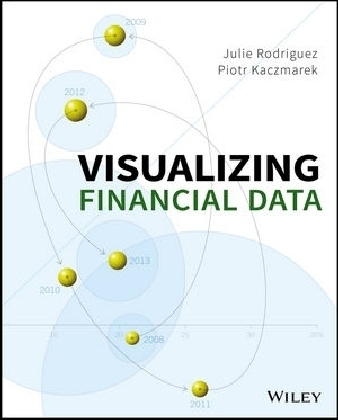
Visualizing Financial Data
John Wiley & Sons Inc (Verlag)
978-1-118-90785-6 (ISBN)
A fresh take on financial data visualization for greater accuracy and understanding Your data provides a snapshot of the state of your business and is key to the success of your conversations, decisions, and communications. But all of that communication is lost — or incorrectly interpreted — without proper data visualizations that provide context and accurate representation of the numbers. In Visualizing Financial Data, authors Julie Rodriguez and Piotr Kaczmarek draw upon their understanding of information design and visual communication to show you how to turn your raw data into meaningful information. Coverage includes current conventions paired with innovative visualizations that cater to the unique requirements across financial domains, including investment management, financial accounting, regulatory reporting, sales, and marketing communications.
Presented as a series of case studies, this highly visual guide presents problems and solutions in the context of real-world scenarios. With over 250 visualizations, you’ll have access to relevant examples that serve as a starting point to your implementations.
• Expand the boundaries of data visualization conventions and learn new approaches to traditional charts and graphs
• Optimize data communications that cater to you and your audience
• Provide clarity to maximize understanding
• Solve data presentation problems using efficient visualization techniques
• Use the provided companion website to follow along with examples
The companion website gives you the illustration files and the source data sets, and points you to the types of resources you need to get started.
JULIE RODRIGUEZ is an Information Architect with experience in user research, analysis, and design for complex systems. She has patented her work in commodities trading and data visualizations for MATLAB, and publishes industry articles on user experience and data analysis and visualization. PIOTR KACZMAREK is an Information Designer with over 20 years of experience in qualitative and quantitative data visualizations, presented in formats ranging from print and digital displays to interactive animations. The companion website gives you the illustration files and the source data sets, and points you to the types of resources you need to get started.
Foreword xv
Introduction xvii
PART 1: INFORMATION GAINS THROUGH DATA VISUALIZATIONS
CHAPTER 1: Paving a Path Toward Visual Communications 3
Information Delivery Needs 5
Industry Demands 6
Enabling Factors 8
Summary 11
CHAPTER 2: Benefits of Using Visual Methods 15
The Purpose of Charts 16
Making Comparisons 17
Establishing Connections 19
Drawing Conclusions 22
How to Leverage Charts 25
Summary 31
PART 2: TRANSFORMING DATA FOR ACTIVE INVESTMENT DECISIONS
CHAPTER 3: Security Assessment 35
Tile Framework 36
Stocks 39
Bonds 42
Mutual Funds 44
ETFs 50
Tile Collection 55
Summary 58
CHAPTER 4: Portfolio Construction 61
Asset Allocation 62
Sector Analysis 67
Sector Leadership 67
Sectors and Alpha Factors 78
Risk Management 85
Overlap of Holdings 87
Stress Tests 99
Summary 106
CHAPTER 5: Trading 109
Ticker 110
Quote 117
Watchlist 127
Visual System: Ticker, Quote, and Watchlist 138
Summary 140
CHAPTER 6: Performance Measurement 143
Market Performance 144
Investment Firm Composite 151
Portfolio Gain/Loss 157
Attribution 161
Return Attribution 161
Risk Attribution 171
Summary 177
PART 3: SHOWCASING DATA FOR EFFECTIVE COMMUNICATIONS
CHAPTER 7: Financial Statements 183
Statement of Cash Flows 184
Nonprofit Organizations 184
For-Profit Organizations 191
Statement of Financial Activity 202
Operating Budget 206
Summary 212
CHAPTER 8: Pension Funds 217
Plan Members 218
Members in Valuation 219
Post Retirement 227
Retirement Programs 232
Contributions versus Benefits 241
Additions by Source 241
Changes in Retirees & Beneficiaries 250
History of Member Salary 253
Funding Ratio 257
Summary 264
CHAPTER 9: Mutual Funds 267
Core Components 268
Allocation Profile 269
Fees 277
Performance 285
Risk 293
Fund Fact Sheets 312
Mutual Fund Comparison 318
Total Returns 319
Ranking Against Benchmarks 324
Summary 332
CHAPTER 10: Hedge Funds 335
Long/Short Positions 336
Long Positions and Benchmarking 344
Fund Characteristics 349
Strategy Rank 356
Strategy Rank and Ranges 361
Strategy Analysis 363
All Strategy Averages 364
Single Strategy Averages 367
Fund Level Returns 373
Summary 378
PART 4: NEXT STEPS
CHAPTER 11: Data Visualization Principles 383
Cater to Your Audience 384
Provide Clarity 394
Be Efficient 403
Summary 414
CHAPTER 12: Implementing the Visuals 417
Business Value Assessment 418
Implementation Effort 422
Available Methods 427
Solution Score 428
Summary 432
Index 435
| Verlagsort | New York |
|---|---|
| Sprache | englisch |
| Maße | 185 x 226 mm |
| Gewicht | 930 g |
| Themenwelt | Mathematik / Informatik ► Informatik ► Datenbanken |
| Informatik ► Office Programme ► Outlook | |
| Mathematik / Informatik ► Mathematik ► Wahrscheinlichkeit / Kombinatorik | |
| Wirtschaft ► Betriebswirtschaft / Management ► Finanzierung | |
| ISBN-10 | 1-118-90785-X / 111890785X |
| ISBN-13 | 978-1-118-90785-6 / 9781118907856 |
| Zustand | Neuware |
| Informationen gemäß Produktsicherheitsverordnung (GPSR) | |
| Haben Sie eine Frage zum Produkt? |
aus dem Bereich


